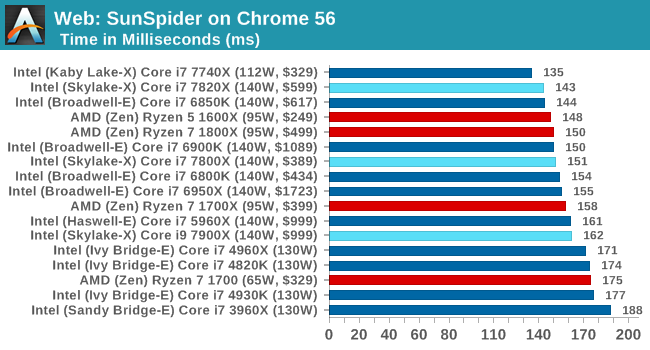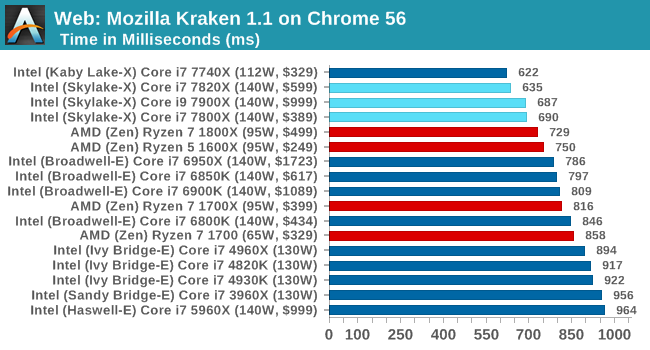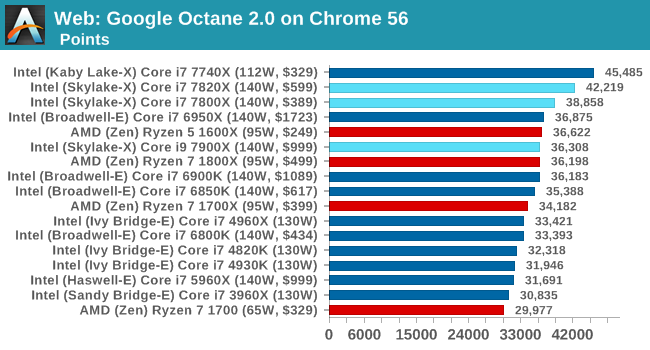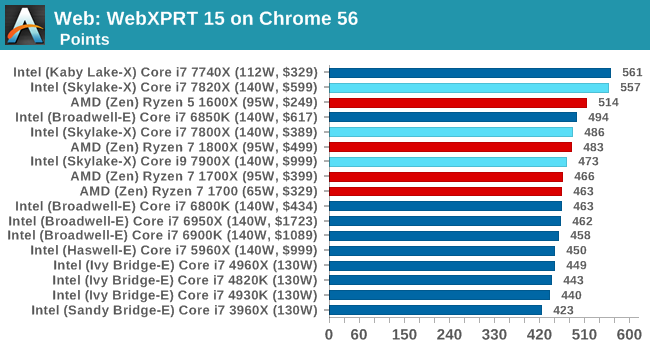The Intel Skylake-X Review: Core i9 7900X, i7 7820X and i7 7800X Tested
by Ian Cutress on June 19, 2017 9:01 AM ESTBenchmarking Performance: CPU Web Tests
One of the issues when running web-based tests is the nature of modern browsers to automatically install updates. This means any sustained period of benchmarking will invariably fall foul of the 'it's updated beyond the state of comparison' rule, especially when browsers will update if you give them half a second to think about it. Despite this, we were able to find a series of commands to create an un-updatable version of Chrome 56 for our 2017 test suite. While this means we might not be on the bleeding edge of the latest browser, it makes the scores between CPUs comparable.
SunSpider 1.0.2
The oldest web-based benchmark in this portion of our test is SunSpider. This is a very basic javascript algorithm tool, and ends up being more a measure of IPC and latency than anything else, with most high-performance CPUs scoring around about the same. The basic test is looped 10 times and the average taken. We run the basic test 4 times.

Sunspider goes after peak frequency most of the time, althoguh there is some variation as it moves into basically becoming a legacy test.
Mozilla Kraken 1.1
Kraken is another Javascript based benchmark, using the same test harness as SunSpider, but focusing on more stringent real-world use cases and libraries, such as audio processing and image filters. Again, the basic test is looped ten times, and we run the basic test four times.

Kraken is more of an intense attack on JS, and still regularly sorts by IPC and frequency.
Google Octane 2.0
Along with Mozilla, as Google is a major browser developer, having peak JS performance is typically a critical asset when comparing against the other OS developers. In the same way that SunSpider is a very early JS benchmark, and Kraken is a bit newer, Octane aims to be more relevant to real workloads, especially in power constrained devices such as smartphones and tablets.

Octane seems to be an optimization target, and with the new Skylake-X it shows.
WebXPRT 2015
While the previous three benchmarks do calculations in the background and represent a score, WebXPRT is designed to be a better interpretation of visual workloads that a professional user might have, such as browser based applications, graphing, image editing, sort/analysis, scientific analysis and financial tools.











264 Comments
View All Comments
Soheil - Sunday, June 25, 2017 - link
Anyone knows why 1600X better than 1800X?OddFriendship8989 - Thursday, June 29, 2017 - link
I'm late here as usual but why are you not comparing against the 7700k and 7600k? I get that these are HEDT chips, but it's worth comparing against the high end mainstream especially when the 7800x and 7700k are priced similarly that someone MIGHT consider jumping over.I hate to say it but this is the typical stuff you guys used to do, and I know it takes more time to put together more CPUs, but logical comparisons MUST be made and these charts show a bit of laziness.
ashlol - Friday, June 30, 2017 - link
can we have the GPU tests pleaseOxford Guy - Saturday, July 1, 2017 - link
"The discussion on whether Intel should be offering a standard goopy TIM or the indium-tin solder that they used to (and AMD uses) is one I’ve run on AnandTech before, but there’s a really good guide from Roman Hartung, who overclocks by the name der8auer. I’m trying to get him to agree to post it on AnandTech with SKL-X updates so we can discuss it here, but it really is some nice research. You can find the guide over at http://overclocking.guide."If you have a point to make then make it. After all, you said you've already "run" this discussion before. Tell us why polymer TIM is a better choice than solder (preferably without citing cracks from liquid nitrogen cooling).
ashlol - Monday, July 3, 2017 - link
Anyway both are bad since you have to delid it to achieve good cooling. I have delidded a 4770k and a 6700k and put liquid metal TIM between the die and the IHS and they both run 15°C cooler at 4.6-4.7GHz@60°C with custom loop. And from seeing the temperature under overclock I will have to delid those skylake-x too.parlinone - Tuesday, July 4, 2017 - link
What I find most shocking is a $329 Ryzen 1700 outperforms a $389 7800X at Cinebench...for less than half the power.The performance to power ratio translates to 239% in AMD's advantage. That's unprecedented, and I never imagined to see that day.
dwade123 - Thursday, July 6, 2017 - link
Only in Cinebench and AES is where Ryzen look good. 7800x beats the 1800x in everything else in this review. Ryzen is too inconsistent in both productivity and gaming. It is priced accordingly to that and not out of good faith from AMD. This is also the reason why Coffee Lake will only top out at 6 cores. because it can consistently beat the best Ryzen model.IGTrading - Friday, July 14, 2017 - link
I absolutely disagree with the conclusion. The correct conclusion can only drawn when comparin apples to apples. Oh, if you want to be objective and compare apples to oranges, you can't just take into considerantion today's benchmark results and price. Have we forgotten about the days we REVIEWERS were complaining about the high power consumption of Pentium 4 and Pentium D ?! What about the FX 8350 ?! Is power consumption not an objective metric anymore?! What about platform price ?! What about price/performance?! Why do some people get suddenly blinded by marketing money?! Conclusion: i-7900X is the highest performance the home power user can get today if money for the CPU , mobo and subsequent power consumption are not an issue. Comparing apples to apples or core for core, the i7820X clearly shows Intel's anxiety with Zen. The i7820X consumes 40% more than the AMD 1800X and costs 20% more while its motherboard is 200% the price. So paying all these heaps of money, CORE for CORE the Intel 7820X is a bit faster in some benchmarks, as it should be considering the power consumption and price you pay, EQUAL in a few benchmarks and SLOWER in a few other benchmarks. Would you pay the serious extra money for this ?! And put up with the 40% higher power consumption and heat generation ?! Come ooooon ...azulon1 - Sunday, July 16, 2017 - link
Wow how exactly is this fair that Intel gets a pass for gaming, because there were problems with the problem with the platform. If I remember Rison also had a problem with gaming. But it didn’t stop you guys then did it. don’t group me into AMD fanboy, But why such a bais?Soheil - Saturday, July 29, 2017 - link
no one answer to me? why 1600X better than 1700 and 1700X and some time better than 1800X?what about 1600? is good like as 1600X for gaming or not?